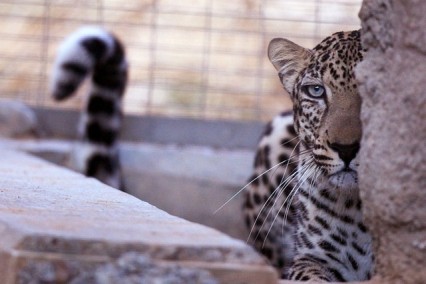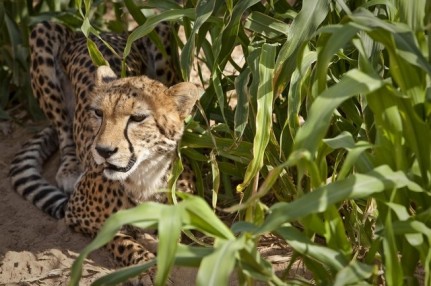August 26, 2014

DUBAI // Dr Ulrich Wernery has seen the dark side of the fascination with keeping exotic wildlife as pets.
When wealthy people pay thousands of dirhams for rare animals such as big cats, birds and even apes without knowing how to care for them, he sees the consequences.
By the time the animals reach the Central Veterinary Research Laboratory in Dubai, where Dr Wernery is the scientific director, they are beyond help.
At least once a month, he and his colleagues receive dead creatures, mostly big cats, hyenas and birds.
Investigations into the cause of death usually yield the same answer – diseases or problems caused by poor diet or other forms of mistreatment by the owner.
This month a cheetah was taken to Dr Wernery’s lab. A post-mortem examination found pieces of carpet in the animal’s stomach.
It had probably been kept in an enclosure with carpeting and had been ripping it apart when hungry, said the doctor.
“People think it is nice if they keep an animal on carpet,” said Dr Wernery, who has seen similar problems in captive Gordon’s wild cats, a rare local species.
“It is not intentional, they do not want to kill these animals but it is all wrong what they do.”
The trade in wild animals is regulated by Cites, the Convention on International Trade in Endangered Species of Wild Fauna and Flora, which has procedures in place to protect rare species.
The UAE is a signatory to the convention, which means rare animals may be traded only with the appropriate paperwork.
Anyone convicted of smuggling endangered wildlife into the UAE can be jailed for up to six months and fined between Dh10,000 to Dh50,000.
But a conservation professional said more needed to be done to enforce the law.
“If you are a rich man with connections and ‘wasta’, you can do what you want,” he said. “No one will inspect what is behind your walls.”
While keeping animals such as primates and big cats in a flat or a garden is already illegal, the Government should regulate private zoos, he said.
“Most of the private zoos are set up on a whim by a very wealthy person and most of those animals are not contributing to conservation,” he said.
“They are basically there to provide entertainment for a family or one person.”
Stricter licensing, regulations and standards would ensure animals are kept in good condition and traded legally, he said.
“The reality is there needs to be more Emiratis getting involved who are well trained, motivated and want to move things forward.”
Despite the laws, wild, exotic animals are still sold relatively openly.
The website souq.dubaimoon.com has a host of wild animals for sale including Arabian oryx, slow lorises and cheetahs, which are all listed as vulnerable to extinction on the Red List of Threatened Species published by the International Union for Conservation of Nature.
The trade of rare animals has serious implications on wild populations that are already under stress, said Dr Elsayed Mohamed, regional director for the International Fund for Animal Welfare.
“There is no doubt that the continuous harvest of the animals from the wild by humans is leading certain species to extinction. This is happening to many species of birds, mammals, reptiles, and even amphibians,” he said.
Another issue Dr Werney regularly encounters – particularly with big cats – is bad diet, with their owners simply not satisfying the animals’ need for red meat, causing them to suffer from malnutrition.
“What they mainly give is chicken but have you seen a lion in the savannah flying after chicken?” he asked. “This is, especially for young animals, not sufficient.”
Malnutrition causes a host of health problems – hind-leg paralysis and trouble with the development of nerves, the spinal cord and the brain.
Dr Werney saw this in three African lions during a chance visit to a veterinary centre in Dubai this month.
“They cried in pain because all the nerves were damaged because of wrong diet,” he said.
“The worst part is this is irreversible. Even if the animals are now fed the right food, they will suffer like this all their lives.”
Corina Berners, a taxidermist at the Central Veterinary Research Laboratory, said the worst example of maltreatment was declawing big cats to make them easier to handle.
The procedure alters the way the animals walk, causing chronic back and joint pain, and is illegal in some countries.
“Over the years, we got three or four animals for postmortem that were declawed, mostly lions,” said Ms Berners, who has practised in Dubai for eight years.
“So there must be someone who does it.”
vtodorova@thenational.ae
via Dark side of UAE’s exotic animal fascination | The National.











